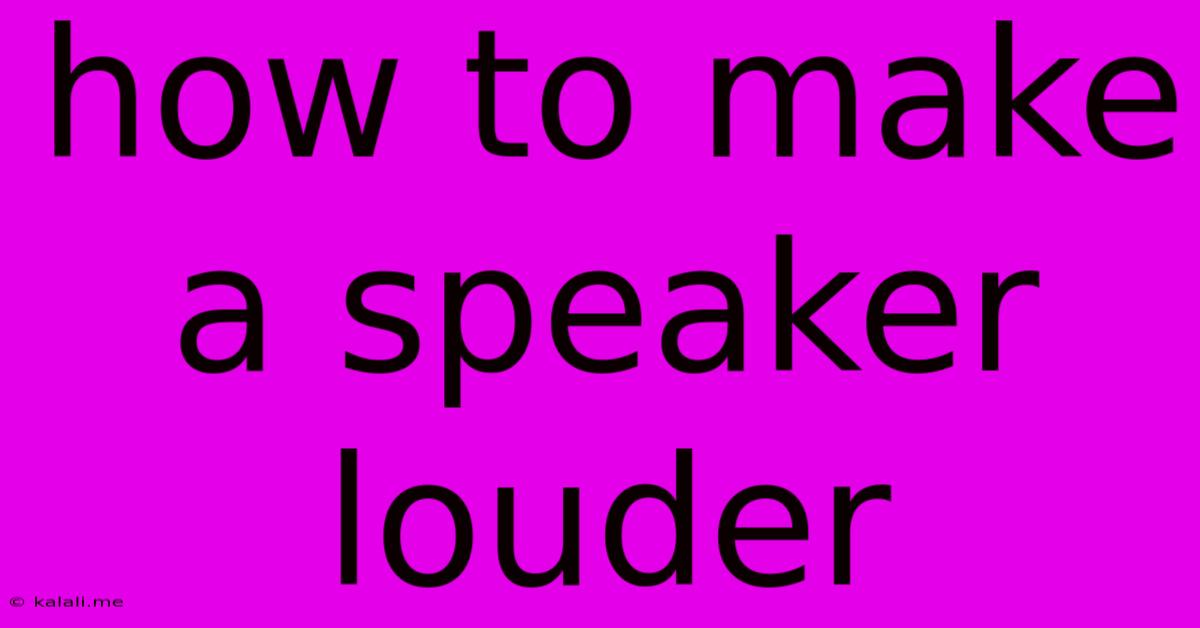How To Make A Speaker Louder
Kalali
Jun 07, 2025 · 3 min read

Table of Contents
How to Make Your Speaker Louder: A Comprehensive Guide
Want to crank up the volume and enjoy your music or podcasts without distortion? This guide explores various methods to make your speakers louder, covering both hardware and software solutions. Whether you're dealing with a faint laptop speaker, a quiet Bluetooth speaker, or a home theatre system, we've got you covered. We'll explore simple tweaks and more advanced techniques to boost your audio output significantly.
Understanding the Limits of Your Speakers
Before diving into solutions, it's crucial to understand that there are physical limitations to how loud a speaker can get. Pushing a speaker beyond its capabilities can lead to distortion, a harsh and unpleasant sound, and even permanent damage to the speaker components. The maximum volume depends on factors like the speaker's size, power handling capacity (measured in watts), and design.
Software Solutions: Maximizing Your Audio Output
Many software adjustments can significantly improve perceived loudness without necessarily increasing the physical output of your speakers. These are often the easiest and safest ways to boost your sound.
-
Adjusting System Volume: The most basic step is to check your computer or device's system volume. Ensure it's not muted and turned up to its maximum. Many devices also have separate volume controls for different applications, so check those too.
-
Equalizer Settings: Experiment with your equalizer settings. Boosting the bass frequencies can sometimes make the overall sound seem louder, although this is subjective. Be cautious about excessive boosting, as this can lead to distortion.
-
Loudness Normalization: Some media players and operating systems offer loudness normalization. This feature analyzes the audio and adjusts the volume to create a more consistent listening experience, making quieter parts sound louder without significantly increasing the peak volume.
-
Audio Enhancement Software: Third-party audio enhancement software can offer more advanced controls, allowing you to customize your sound profile and potentially increase perceived loudness. However, be mindful of the quality of these programs; some may introduce unwanted artifacts or distortion.
Hardware Solutions: Boosting Your Audio Output Physically
For a more substantial increase in volume, you might need to consider hardware solutions. However, remember to respect your equipment's limitations to avoid damage.
-
External Amplifier: An amplifier is a device that increases the power signal sent to your speakers. This allows them to produce a louder sound without straining their internal components. This is a great option for passive speakers (speakers without built-in amplifiers).
-
External Speakers: Upgrading to higher-quality speakers with a higher wattage rating will naturally result in a louder output. Consider speakers designed for your specific use case – whether it's for a desktop computer, home theatre, or mobile device.
-
Speaker Placement: The position of your speakers significantly impacts their sound. Experiment with positioning to find the sweet spot in your room. Avoid placing them in corners or against walls, as this can lead to unwanted reflections and muddied sound.
-
Subwoofer: If you’re looking for louder bass, adding a subwoofer can significantly enhance the overall perceived loudness, particularly in music with strong low-frequency content.
Troubleshooting Quiet Speakers
If your speakers are still too quiet even after trying these methods, there might be underlying issues:
-
Faulty Speaker Cables: Check your speaker cables for damage or loose connections. Try replacing the cables to rule out this possibility.
-
Driver Issues: If you're using computer speakers, outdated or corrupted audio drivers can affect volume. Check for driver updates on your computer's manufacturer website.
-
Hardware Failure: In some cases, the speaker itself might be faulty. If you’ve tried all other solutions and the problem persists, it might be time to consider repair or replacement.
By implementing these strategies, you should be able to significantly increase the volume of your speakers while maintaining good sound quality. Remember to always prioritize safe listening practices to protect your hearing and your equipment.
Latest Posts
Latest Posts
-
Can I Use Potato Starch Instead Of Cornstarch
Jun 08, 2025
-
What Tribe Of Israel Am I Descended From
Jun 08, 2025
-
How Do You Take Off Restricted Mode On Youtube
Jun 08, 2025
-
Why Apple Chargers Dont Work On Windowa
Jun 08, 2025
-
When To Paint Pressure Treated Lumber
Jun 08, 2025
Related Post
Thank you for visiting our website which covers about How To Make A Speaker Louder . We hope the information provided has been useful to you. Feel free to contact us if you have any questions or need further assistance. See you next time and don't miss to bookmark.